Sunday, October 11, 2009
Wednesday, May 27, 2009
One Last Post
Should I stay or should I go?
And I've decided to go. But as an opera diva, I never leave without leaving a lasting impression of myself.
My current emotion: Extremely happy to be done with Augsburg.
I was just talking about this to my host parents yesterday and it was interesting for me to recap the four years that I've lived through Augsburg. My music classes, my friends, my professors, my lessons, my jobs (yea, holy crap did I work like a donkey!), my room mates, the dormitory, and being an international student in a practically all white private college...I'm pretty proud of myself. My achievements did not necessarily show academically, but they're found in the things that I've learned and the strength and wisdom that I've gained. It was definitely an experience to go to a college like Augsburg.
How do you find motivation to strive in a school that is not known for it's music performance programs?
How do you find comfort in your identity when you are flooded by all American students from small towns?
How do you make peace with your four year neighbors who are completely different from you?
How do you love?
How do you enjoy?
How do you not sabotage the money that you've paid for this educational experience?
Where am I currently?
I am living with my host family which I absolutely adore. They are fun, weird, and crazy! And most of all, they are dreamers.
They are not afraid of dreaming and achieving their dreams.
I cannot ask for a better family.
What's my plan in the upcoming years?
Well, I'm going to be an internationally acclaimed opera singer. I love singing and I am convinced that I have what it takes to get there.
For now, I just need to make sure that I am financially capable for grad school/conservatory training in the future.
To my good friends, thank you for caring so much to read my blogs. And we will keep in touch.
Otherwise, for the miscellaneous readers, I hope you'll hear of my singing in the future.
And don't be afraid to approach me. I might be able to sing very loudly, but I don't bite!
Evelyn Tsen
Saturday, May 2, 2009
Graduated
With 3 honors.
and a diploma in Music Performance.
How amazing is this?
I am no longer a college student.
And I've graduated debt free.
Praise the Lord.
I've worked hard, but oh man, God really made it happen for me.
I just want to take this time to thank all the Augsburg faculty and professors for all the hard work that they've put in making this happen.
And to my Mac Phail family....
All the kind smiles and hopeful laughter that we've shared together.
Without you guys, I would not have made it.
I can actually leave this campus with a content smile on my face.
I've gotten all I needed out of this college.
And I hope that I've given and will continue to give just as much in return to this college.
With love,
Evelyn Tsen
Thursday, April 30, 2009
Last Repertoire Test Ever...maybe
Hmm...am I qualified to graduate with a Bachelor's diploma from the music department?
Let's hope so. It would suck to fail your very last music test on the very last day of school. lol
Anyways, yes jie! you're right.
When I grow up, I do wanna be a child! =)
Have you watch the movie of Benjamin Button? It kinda contradicts that thought.
Makes you wonder if you really wanna become a child again when you grow old.
So, guess what? My dad's arriving tomorrow!! I get to finally see my dad again.
yay!
And he's gonna hear me sing for the first time. Ain't that cool? I'm singing my Poison Aria from Gounod's Romeo and Juliette.
Let's hope he'll like it and applause. Otherwise, I might have to end up drinking the potion.
NAH! Joshin!
I'm sure you're all wondering how it feels to finally graduate huh?
Well, it feels awesome.
But I'm not quite sure how a graduate would feel post graduation.
I'll let you know as soon as I find out.
love,
Evelyn Tsen
Tuesday, April 28, 2009
Finding Words
I'm trying to find words to describe what it is I'm actually feeling.
It's a cocktail of liberation and constipation.
All in a cup.
It's interesting how I'm currently listening to BenFolds.
Brought me back memories from freshman year.
Where everything Tyla and I listened to was Ben Folds.
I wish my entire college life was somehow video taped.
So I can rewind.
Go back in time and I don't know...
I guess there are so many things about college that I wish to remember more often.
And forget all at the same time.
Must grow up now.
Can't sit around.
Must deal with life like an adult.
And why the hell am I being so overwhelmed?
I have been doing this for the past 4 years.
I have been taking care of myself.
I know this...
...RIGHT! lol
OHH!! ben folds' soooo right.
Everybody knows, it does SUCK to grow up.
It hurts.
Cabbage Wabbage
Done with School?
It's weird to be done.
Do I really have the freedom to do what I like to do?
Can I finally do what I want to do to make this world a better place?
To actually be "productive"?
It's so weird to think that I've been here for four years, and I can finally leave and be my own.
No more dumb academic grading system.
No more stupid student worker jobs.
No more homework from dumb classes that I could careless about.
No more dealing with new roommates from small towns.
No more dealing with professors.
No more professors.
No more spending money on extremely useless but expensive textbooks.
No more maroon and white.
No more Res Life.
No more tuition fees.
No more coffee shop.
No more practice rooms.
No more knowing everyone around you.
No more college.
All of the sudden I feel...
overwhelmed.
Like I'm gonna throw up....
Cabbage Wabbage
Sunday, April 26, 2009
My Previous Posts
Sometimes, I don't even think about what I am or will be typing.
I just type and I do it as a paying job as well as for leisure.
So I must apologize before college ends for some inappropriate things that I shouldn't have exposed or worded in public.
And sure you can make assumptions of who I am since more than half the things I type in here are assumptions anyway.
However, if I did say certain things that you know for sure are false or offensive, I do wish to be called out.
I have always been one who makes wrong assumptions. So, I really don't mind being called out and corrected.
Just so you know ;)
Cabbage Wabbage
Final Sunday in Augsburg College
Solo at United Methodist Church
Grocery shopping
Study for Music Business final
Honors Banquet
Homemade meeting
Yay!
Cabbage Wabbage
Saturday, April 25, 2009
Realizations
It sounds crazy but I really do think that to become a classical musician, you must say "I do" to your instrument.
Your voice becomes your top priority once you respond to its calling.
As my teacher once taught me, it is a very jealous master.
In order to perform it in its most stunning being, it requires your utmost attention.
Be a servant to the voice, but never a slave.
Isn't it interesting? And people wonder why classical musicians deserve to be paid hundreds of thousands of dollars.
We shed blood each time we perform. We give away a part of ourselves.
I don't know if I can represent all the musicians out there. But I know that each time I perform, I want the listeners to love the piece as much as I do.
Each time perform, I want listeners to enter the realm where I live.
Each time I sing, I want them to remember the life beyond what we can see and touch.
I want them to hear, to feel, to smell the piece the way I do.
Yea...I know. We're all crazy people. I rather not spend time on this blog trying to justify my insanity.
So, good bye for now.
Cabbage Wabbage
New Pieces
Now that I'm done with my performances for this year, I'm starting to look for new pieces.
Potential pieces for Met auditions, Schubert Club, and recording...
What am I suppose to look for when I choose my repertoire in the upcoming year?
1. Potential debut role
2. It must fit where my voice wants to go
3. Cannot be bigger than what I can do for now
4. The characteristics has to have some similarities to my personality
Cabbage Wabbage
Bored from Procrastination
Such a depressingly boring day. So here I am surfing online for interviews of Miss USA 2009.
I remember those nights when I would faithfully sit by the TV watching the Miss America Pageant.
Interesting how that title means so much to some of those girls in the pageant. The crown and tiara, and the scholarship. Spending an entire teenage life dreaming and working to become Miss USA. And then what?
Yea...I really wonder what she's up to today after winning the crown.
Cabbage Wabbage
Friday, April 24, 2009
Minnesota Opera Audition
I have an idea of what to expect. All I can do is to trust that I know what to do once I hit the stage.
Peace...
Cabbage Wabbage
Tuesday, April 14, 2009
Scene Introductions
In this piece, there are 2 characters, me a girl who misses her lover and a little breeze.
Throughout this piece the girl is telling the "little breeze" to tell her where her lover is.
You can hear in the piano's part where the breeze comes and goes.
As the piece progresses she understands that she is not allowed to see her lover,
so she ends by sending the breeze away to her lover so it may speak for her.
Chi il bel sogno di Doretta pote indovinar?
This is an aria from the first act of La Rondine by Puccini. In this scene, Magda the character singing this aria is having a cocktail party in her salon. She begins this aria by entertaining her guest with a story about a dream that her aunt named Doretta had. As she continues, she is reminded of her own youthful affairs that she had in the past, which brought back the emotions that she once had for her past lovers.
Quando m'en vo
Also known as Musetta's aria from Puccini's from La Boheme. This scene is set in a cafe where Musetta's former lover Marcello was hanging out with his buddies. Musetta walks in with another man, spots Marcello and decides to sing this risque aria with determination that she will get his attention again.
Dieu Quel Frisson
Also known as Juliet's poison aria from Gounod's opera of Romeo and Juliette. This scene is set in the cathedral by the tomb of her ancestors. The friar has just given Juliet the poison that will temporarily leave her lifeless. And she must decide to drink it before her family arrives and marries her to the Count. Her only other option is to kill herself with the dagger. You will see how she arrives to her decision as she talks to herself and see dark imageries in her head. Please forgive the simplicity of the props. Here is the altar and here is the tomb. The rest will depend on your imagination.
Monday, April 13, 2009
The Lady
Coming into the Last 2 Weeks of School
This weekend I spent lotsa time realizing how close I am to being done with college.
It's kinda scary.
The thought that I better get my act together.
Search for music jobs.
Get my resume together.
Start singing for churches.
Get a car.
The hardest part about being so close to the end of college is finishing school strong.
It's kinda difficult to remember that I still need to study for finals and walk during commencement.
On top of that, I need to figure out how I'll be moving outta this place.
Yea...Tons to think about.
But I guess the best thing to do is to deal with things one at a time.
And quit being such a worry wort.
Cabbage Wabbage
Saturday, April 11, 2009
Eileen Farrell
By http://www.youtube.com/user/Onegin65
Listen to the narrowness of the sound that she is giving.
It's very smooth because there is such a great mastery in how much air she is giving out on each note...
Singing on the vowel and consonant with great musicianship.
Voice is moved by what is written in the music.
Great. Exquisite.
I like her.
Cabbage Wabbage
My Teacher
One who is like a mother to me.
She is the one who nurtured my artistry.
She is the one who held my hand and told me that it's okay.
"It's okay to be weird."
"Evelyn, we are all crazy. But that's what makes us different--special and unique."
She is the one who gave me the permission to be my own.
She is the one who opened new doors in my life.
May it be the doors of my dark past.
Or doors to the higher and better place.
She will walk by me, and carry me through all of them.
My teacher is a badass.
She kicks butt.
And tells me that I can do the same.
=)
Her elegance makes the weak fear her.
Her strength scares the evil.
And she walks her religion.
She lived and now preaches the life of a great artist.
She is who is.
She will forever be the true Diva in my eyes.
Thank you Audrey Stottler.
Cabbage Wabbage
My Recital
It was the best thing that has ever happened to my singing career.
People were tearing up--sheets of kleenex, glasses off, eye wipings, the smiles and sighings.
It was beautiful.
The music was. And everyone knew that it was.
This is what I've always wanted and will forever want to do.
Inspire.
Not to impress but to inspire.
I want to sing for the people--
People who cannot sing,
beyond all language barriers,
beyond all emotional baggage,
beyond all skin colors,
beyond all hearing,
beyond all stories,
beyond my personal interest,
beyond all types of interpretations.
I want to sing for the music.
This is what I learned through my recital.
I have the power and the gift to do so.
So why waste it?
Why sit around and doubt?
No more.
I sing because this is who I am.
A singer. A musician.
A humble servant to the Higher Power.
This recital was great, beyond my personal expectation.
But it is merely the beginning.
Thank you for all who have and are supporting me.
Cabbage Wabbage
My Mom
Meeting my mother, having her hear and watch me for the first time has given me a chance--permission to move on.
Little did I realize the greatness of a mother's love.
How much did all those questionings hindered from my growth as a young lady...when they were all merely assumptions with no evidence.
What was is it that happened when I was just a child? I could never remember the details of incidents clearly, but the conflicting emotions raging in me--those were the things that I remembered.
As my sister and I ran(literally) to the airport to pick my mother up the day before my recital, I've realized how amazing it was for me to have the opportunity to sing for my mother for the first time.
How many great artists get the chance to sing for their parents? I'm sure its not very many. And there' especially not many parents who would be willing to sacrifice time, money and energy to fly half way across the world to hear and watch their children sing.
When I saw my mother's sweet, loving and slightly exhausted face, I knew right away that all the anger and resentment that I had against my mother were illusions and assumptions. They were unnecessary and meaningless.
How did I manage to be angry at this sweet and loving lady?
As we embraced, I felt her strength for the first time.
My mother is a strong lady. Her power resonates through my skin. Her confidence radiates upon my face.
This I truly admire.
Thank you for your love.
Thank you for your heart.
Most of all, I thank God that I am a part of you and you are a part of me.
Cabbage Wabbage
Wednesday, April 8, 2009
Hello Mom
Here to be with her daughters.
And also to watch and hear me sing.
My heart has been pounding like crazy ever since I woke this morning.
Today's the day.
I hope you can make it.
Cabbage Wabbage
Sateren at 4:30pm
Wednesday, April 1, 2009
Discoveries
1) it is very hard to type on the key board with fake nails sticking out of your finger tips
2) I found a new opera role that I will be singing in the future. Amina from Bellini's La Sonnambula
3) I found the tenor who I want to sing with in the future: Juan Diego Flórez
4) I cannot stand listening to Natalie Dessay if only she wasn't that good at acting
5) High notes are thrilling and trills are ticklish
To end:
Cabbage Wabbage
Monday, March 30, 2009
1989 Dmitri Hvorostovsky
So, here's the deal. I'm trying to educate myself on the voice of a baritone.
They sound so weird. No offense. I think it's gonna take a while before I'll learn how to love that sound.
Hvorostovsky. I don't like his singing today. But man was he good in 1989.
It was just so simple. It use to be so simple.
Just sung. That's all. No artsy fartsy stuff.
Cabbage Wabbage
Nothing more I love than:
Care Packages
Encouraging and sweet notes
Hugs from MANY little kids
Smiles and smiling back
Sun light
light
Colors...many many many colors
Animal watching (Coz people are too dumb to watch)
Reading e-mails from family NOT school
and of course...
REAL music =)
REAL musicians
Cabbage Wabbage
5 More Days to My First Off Campus Recital:
I feel like in this past week, my voice has gotten bigger. Like...WAY bigger. It takes a lot of energy to focus on my air and I need to take much deeper and bigger inhale breaths.
So, I've decided that since changes happen whether or not I like it, why don't I just keep practicing until I can practice no longer. These recitals are not the end point to my career. It's just another destination that I must past to get to my end point.
I've learned and experienced so much from preparing for these recitals. I can't imagine having to learn more than what I have already learned.
I guess that means more excitement and adventures for the future.
THE UNKNOWN.
Somehow, it's a very bitter sweet thought.
I am so comfortable with where I am at right now. Why must I leave?
Cabbage Wabbage
Nothing more I hate than:
Untrustworthy co-workers
Rudeness
Bullshit from authority
Passive aggressive room mates
Pricks that are directing opera companies
Oh and also,
when I get my cash card stolen...
sigh....
Cabbage Wabbage
Saturday, March 28, 2009
Leontyne Price Said...
I am here and you will know that I am the best and will hear me. The color of my skin or the kink of my hair or the spread of my mouth has nothing to do with what you are listening to.
For a long time the only time I felt beautiful -- in the sense of being complete as a woman, as a human being -- was when I was singing.
Art is the only thing you cannot punch a button for. You must do it the old-fashioned way. Stay up and really burn the midnight oil. There are no compromises.
Once you get on stage, everything is right. I feel the most beautiful, complete, fulfilled. I think that's why, in the case of noncompromising career women, parts of our personal lives don't work out. One person can't give you the feeling that thousands of people give you.
On performing in the new Metropolitan Opera House: The ghosts from the old house -- Caruso, Flagstad -- all those folks -- have moved uptown, too. When I'd look up at the gold ceiling, there they'd be, swingin' around, saying to me, "Lee, you mess it up and we'll take care of you!"
I absolutely love her. She is DEFINITELY my role model.
Cabbage Wabbage
It Never Cease to Surprise Me
Different artist, different interpretation.
However, the interpretation must lie in the convention of the composer's intent.
If it leaves the composer's expression, then it is no longer true to the music.
So, how does an artist know if she is true to the music?
When the artist feels comfortable and right in her own skin while singing the piece.
When the artist knows that the voice is doing justice to the music.
When the artist is generous, not fake, but sincerely willing to give all she can through the music.
A gift is only a gift if it is worth something precious in the eyes of the giver.
A gift is only a gift if the presenter does not expect anything in return after giving the gift away.
A gift is to be given away whole heartedly.
And that's how the giver of the music knows that she is being true to the music.
If it feels right, then it is.
If it feels selfish, and self sabotaging, then it definitely is so.
If you find yourself sweating and panting at the end of the piece, but you could still go on singing your life away, then it is right. You are right.
Do you get it? There's no limit to great singing. There are no rules involved.
It's just you and the music.
Cabbage Wabbage
Idle...
I never realized how much time that job took up. But now that it's gone, I actually get to put in 3 hours of practicing in piano and voice no problem.
But then for he rest of the day. I linger. I am idle. lol
I bet this would really surprise those that have known me for the past 4 years.
Humans are not meant to be on idle. It's good for the brain to be thinking, and the body to be moving, and for the soul to keep wanting.
Otherwise, there is really no point in living if there is no goal to fulfill.
Like today, I woke up. And the thought that I have no job to work, and no school to worry about made me rather useless and wasted away.
SO, my goal for this weekend is to:
Pull together a resume.
Put together a list of music places that I would like to work for next year.
Focus on my recital repertoire.
Cabbage Wabbage
Friday, March 27, 2009
Yes , it is official
The day before spring break began, I decided that this job and the disgusting management was too much for me to bare for April. I have too much to stress out and worry about, that this nonsensical job is NOT worth my time at all. The dramas that the food service business create amongst themselves is so unnecessary. They make life hard to live--for themselves, as well as others.
In a way this is very liberating. I am no longer known as the coffee shop girl who looks like Lucy Liu, or the Singer who works in the coffee shop everyday. lol.
I've been working at that place for more than 3 years, it's about time to move and catch bigger fish.
Plus, it's just not the same ever since Kathy left. It'll never be the same again.
Thank you for all of you who have made my coffee shop experience sane and fun.
Cabbage Wabbage
Home Sick
The thought that my mom is flying in to the US on the week of my recital is actually giving me butterflies in my stomach.
She has never heard me sing live. The first and last time was during a choir's Vespers.
And I remember clearly she said that I could have done better in my solo.
Which was true, for some reason because of that memory, I can't help but to wonder if she'll say the same thing about my upcoming recital.
But I do not wish at all to sing to impress her. I don't need or want to.
On facebook, it looks like I'll be having close to 90 guests who would be coming to my recital. Exciting.
I'm gonna bring the house down baby. =)
I wonder what my mom's reaction would be...
Cabbage Wabbage
Thursday, March 26, 2009
Caruso
Published by http://www.youtube.com/user/maldoror26
This is a funny piece...lol
Cabbage Wabbage
Breathing Therapy
Our noses have left and right nostrils. Are these nostrils having the same function for inhaling (breathe in) and exhaling (breathe out)?
Actually it's not the same and we can feel the difference. Accordingly, the right side represents the sun and the left side represents the moon.
When having headache, try to close your right nostril and use your left nostril to do breathing for about 5 min. The headache will be gone.
If you feel too tired, do it the opposite way. Close your left nostril and breathe through your right nostril. After a while, you will feel refresh again.
Because the right side belongs to heat, so it gets hot easily. The left side gets cold easily.
Women breathe mainly with their left nostril, so they get calm down easily.
Men breathe mostly with their right nostril, so they get angry easily.
When we wake up, do we notice which nostril breathes faster? Is it the left side or the right side?
If the left nostril breathes faster, you will feel very tired. Close your left nostril and use your right nostril for breathing and you will get refresh quickly.
For some reason, my left nostril is always plugged. And I breath out my right nostril a lot...maybe that's why I'm always angry...or maybe I'm just a very boyish girl...
Hmm...Interesting!!
Cabbage Wabbage
Tuesday, March 24, 2009
The Uniqueness of Being an Opera Singer
Cite from http://answers.yahoo.com/question/index?qid=20070921051231AAw1wAf
Opera Singer's Income
The beginning opera singer does things for free in college. Most of us study in college. So everything you do will be pro bono, unless there is an opera chorus around you. After you pass that stage. you have to build a reputation.
Your income depends on the company you will be working for, the size of your rep, and what role you are singing. Some smaller companies might start you off with $300 to $1,000 a performance IF you have a decent role. Chorus members in a smaller or B list company will usually get a lump sum at the end. In the US, the chorus doesn't earn much money, unless the company is pretty established and extremely reputable.
The Met used to start chorus members with $75,000 dollars a year. It might be higher now. But Met chorus singers are ALL established singers who have careers of their own on a whole new level.
There is more money for opera in the overseas. Not only for leads, but also with the chorus. They value opera more overseas, and they put more money into it. Also, classical singers get paid to sing oratorios, solos, and other events. The pay varies, but if you are good, you wouldn't charge less than $100 for ANY service.
Once you get into the big leagues, the pay is phenomenal. We are talking in the hundreds of thousands of dollars just for one role or one performance. But MOST opera singers don't get to that point, just as any other genre.
Opera singers usually don't make money on album sells. Like pop stars who make money off of tours and ads, opera stars make money off of recital tours and singing roles with opera companies. Whether you can earn alot of money is really up to how hard you are willing to work.
Most classical singers have another job FOR YEARS in order to stay afloat, because you are constantly auditioning and paying for coachings, classes and lessons. THIS IS WHY IT IS EXTREMELY IMPORTANT to get your degree in music. Without that degree, you can't teach. You will be stuck waiting tables and doing hard jobs without flexible hours. The majority of opera singers retire and teach anyway.
But if you are ready to deal with alot of rejection and times of frustration, and EXTREMELY hard work, you can earn alot of money. But the reality is, the opera industry is a cruel and unforgiving world .
The plus side to being an opera singer is longevity. While the shelf life for the average contemporary singer is 5 years, opera singers will have a career for 20 years PLUS. Opera singers know they can depend on their gift even if they might not have the curves or the looks to be onstage.
Cite from http://answers.yahoo.com/question/index?qid=20070921051231AAw1wAf
Venues in the Twin Cities
Skylark Opera (Landmark Center or Pearson Theater in Concordia University in St. Paul) $25 to $43
Minnesota Opera (The Ordway Theater in St Paul) $50-$150. There are discounted prices for students and student rush tickets
Community Center operatic/musical theater performances $10-$20 or free
Metropolitan Opera Regional Competition (Ordway Theater or Tedmann Hall at the U of M) Free
Metropolitan HD Broadcast in Theaters (Listings Online) $18 per ticket
Recital Performances
Ensemble/Solo performances in churches (Basilica, St.Mary Cathedral, Central Lutheran Church, Mount Olivet Lutheran Church, Plymouth Congregational Church) <$15 or free
Student recitals in university or college recital halls or auditorium
Saint Paul Chamber Orchestra (The Ordway Theater/ Community Churches) $10-$30
Schubert Club $15-$45 (The Ordway Theater)
Monday, March 23, 2009
The Most Encouraging Article I've Read
Ben Rosen: The Metropolitan Opera--Turnaround Case Study
Okay class, pay attention. Here's today's business problem:
It's 2006. You're hired to run the largest performing arts organization in the world, a 125-year-old household name. Every year, you stage over 200 performances per year of a couple of dozen different operas. Your performances are heard by millions of radio listeners around the world. And until the year 2000, your ticket was the hardest to score in New York City.
But in the last six years, everything's gone awry. Attendance has declined sharply. Costs have risen every year. Philanthropic contributions have flattened out. The endowment is woefully inadequate. Competition for the cultural dollar is soaring. There are signs of organizational complacency. And even though your audience is disappearing, you have no marketing organization in place to try to offset the decline.
What to do? Can anything be done? Is there a solution?
Well, in fact, this would indeed make a splendid business-school case study. And a much more interesting one than the run of corporate cases that MBA students are challenged with.
The dire situation outlined above is not hypothetical; it's real. It's what faced the Metropolitan Opera just two years ago. A little background:
In the 1990s, the Met essentially sold out the house every night. The 4,000-seat theater was filled seven times per week for over thirty weeks per year. Every night a different opera. Costs rose every year, but they were offset by the ability to raise ticket prices with impunity. Philanthropy was healthy, so the lack of a healthy endowment was not an issue. Also unimportant was the lack of a marketing team -- no need to create demand when almost every performance sells out.
Then came the millennium, and everything changed, and for the worse -- attendance, philanthropy, competition, subscriptions, and the bottom line. There are a lot of reasons for this collapse. For the Met it was a virtual perfect storm. Early in the decade, a recession began. Then 9/11 rocked the world. This tragedy, in turn, adversely affected travel, cutting down sharply visits by domestic and international opera-goers.
Customers began to resist the high price of attending an opera. And changes in lifestyle caused the subscription rate to fall -- less planning in advance, more spontaneous ticket-buying. As subscription-ticket sales fell, they had to be offset by single-ticket purchasers; single-ticket sales require expensive advertising campaigns. The aging audience was not being replaced by younger attendees. And the standard repertory of familiar operas by Verdi, Puccini, Mozart, et al., could no longer be counted on to fill the house automatically, at least not without megastars singing the major roles.
Moreover, this century-old dowager was getting a little dowdy, a little ragged around the edges, a little stodgy, and reluctant to change with the times. Then, in 2004, its longtime general manager, Joe Volpe, announced his desire to retire within two years.
The Met board, of which I was a member at the time, initiated a search for a new general manager, and I was appointed chairman of the search committee. (I retired from the board last year, but continue to serve as chairman of the marketing committee.) After a seven-month search, we selected Peter Gelb, former CEO of Sony Classical, as our choice to manage the Met, and the full board unanimously approved our choice.
Gelb served a year and a half as general-manager designate, working closely with Volpe, and then officially began running the show at the start of the 2006-07 season. (The seasons run from September through May.) Because operas are planned as many as four years in advance, the programming and total impact of the new administration will not be fully realized until the 2009-10 season. Yet starting with his first season, some changes were able to be made to the repertory -- a few new productions shoe-horned in, a director change here, a new singer there, a set designer change here. This process continued into the just-ended 2007-08 season, and more changes will be realized next year. By 2009-10,Gelb and his team will have full responsibility for the entire season's repertory -- as well as for the overall results of the organization.
Although Gelb had never run an opera house before, he knew a lot about dealing with artistic talent (having spent a large portion of his career in artists' management). But what really appealed to the selection committee and to the board was his marketing flair. And if ever an organization needed marketing, it was the Metropolitan Opera. Here's why:
Decline in the box office: We enjoyed virtual sold-out houses (blue bars) in the 1990s. Then, beginning in 2001-2002, the box office dropped steadily, bottoming at 77% of capacity (orange bars) in 2005-06.
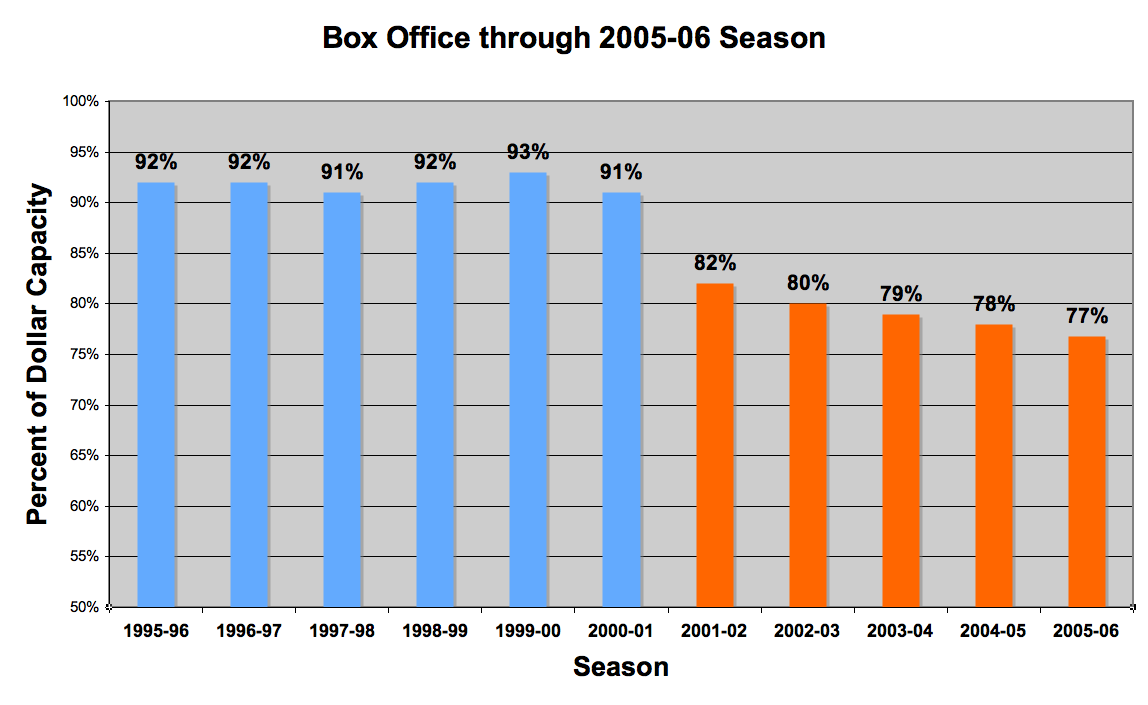
Decline in sell-outs: The house was no longer selling out at it was in the 1990s. By 2006, only 10% of the performances sold out.
Subscription decline: As a final measure of the deteriorating situation, subscription growth had turned negative. For four straight years through 2005-06, the number of full-series subscribers declined. This meant that more effort had to be poured into selling single tickets, with the requisite additional advertising costs.

Turning the battleship around
To turn the ship around - i.e., fill the house -- three major initiatives were undertaken: (1) improve the product, (2) create a major marketing effort, and (3) add new sources of revenues and audience development.
(1) Improve the Product
The Met product has always operated at a very high artistic level, and particularly on the musical side. But there was still room for improvement on a variety of fronts.
Singers: Stars sell. The Met has always attracted the biggest stars in the world, but often they wouldn't agree stay for the entire run of an opera series. A diva might perform in two or three performances of an eight-performance run. Then, a less-compelling replacement would fill out the run. That is changing. More of the world's best artists are now being signed to appear in more operas, and in more appearances per opera.
In return, the Met is beginning to actively promote the stars. For example, in the last two seasons, the images of superstars Anna Netrebko and Natalie Dessay were featured all year in advertising, brochures, tickets, bus signs, telephone kiosks - you name it, their faces were all over New York City. Next season will be Renée Fleming's turn.
Renée Fleming
Directors and set designers and costumers: To enliven the visual experience, the Met is hiring more directors from the theatrical and film worlds. For example, Anthony Minghella (Madame Butterfly), Bartlett Sher (Barber of Seville), Jack O'Brien (Il Trittico), John Doyle (Peter Grimes), Mary Zimmerman (Lucia di Lammermoor) and others have already directed operas in the last two seasons. Similarly, imaginative new set designers and costumers are being hired to help make the visual impact as exciting as the musical experience. Look, for example, at the spectacular visual effects from the recent Satyagraha production:
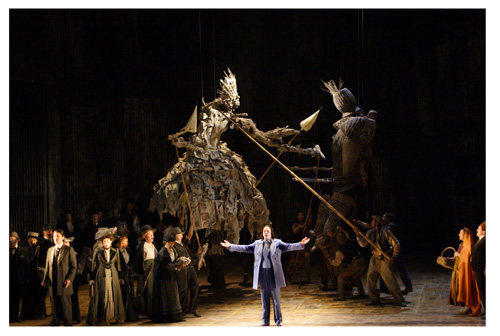
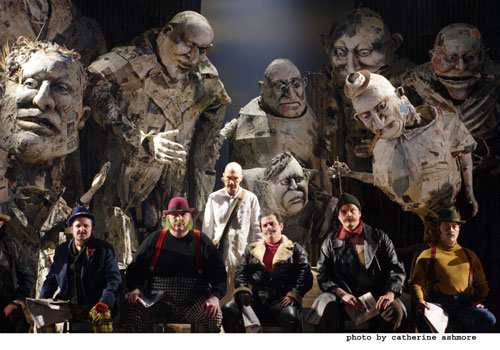
Satyagraha scenes, 2007-08 season
Acting: Concomitant with the above changes, more attention being paid to the acting side. There is a palpable movement away from overweight, immobile singers who "park and bark" to those whose acting ability is commensurate with their singing talents. Anyone lucky enough to have seen Natalie Dessay in La Fille du Regiment saw one of the great comic acting performances of our time. Or Anna Netrebko in any of her performances of the last two years that combined her incredible vocal talents with an astonishing theatrical capability.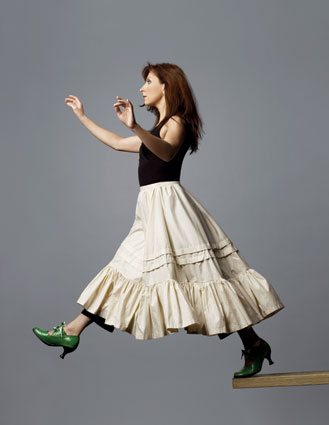
Natalie Dessay
Conductors: Other initiatives include the hiring of more world-class conductors to perform when the Met's music director, James Levine, is not in the house. Levine conducts only 50 or so performances per year, leaving 170 or so to be handled by other conductors.
It's important to note that all this is being done without sacrificing the artistic mission of the Met. It would have been easy, for example, simply to program a full season of audience pleasers and ignore the more obscure or contemporary or challenging works that are so hard to sell. But the Met always has presented, and will continue to present, a complete spectrum of great opera, a range that includes contemporary works as well as less familiar older ones.
But contemporary and obscure operas could be a financial disaster unless a sophisticated marketing effort were in place to create demand. These days, it's no longer financially acceptable to tolerate a half-empty house for a less-accessible work, as has been the case for many years. So that's what leads us into the next major initiative - marketing.
(2 Create a Major Marketing Effort
Rule One of marketing is, Great marketing starts with a great product. Rule Two is, See Rule One. As noted above, the overriding effort of management is to make the entire opera experience better than it has ever been. Once that has been achieved, marketing can go to work and help fill the house. But if the product isn't any good, no amount of marketing can make it succeed. As Bill Bernbach, the founder of legendary advertising agency Doyle Dane Bernbach said, "Good advertising makes a bad product fail faster."
Until two years ago, the Met was essentially a marketing-free organization. How that has changed! A first-class department has been created, with the advertising and public relations efforts revivified, and the website upgraded. The upshot is that the list of new marketing initiatives in the last 24 months is almost endless: Times Square opening-night live telecasts, opera sets displayed in Saks Fifth Avenue windows, red carpet opening nights, free opening-performance dress rehearsals, creation of an art gallery, and Met signs and banners and posters everywhere.
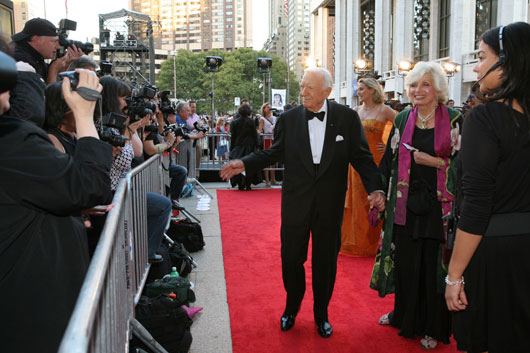
Walter Cronkite on the opening-night red carpet
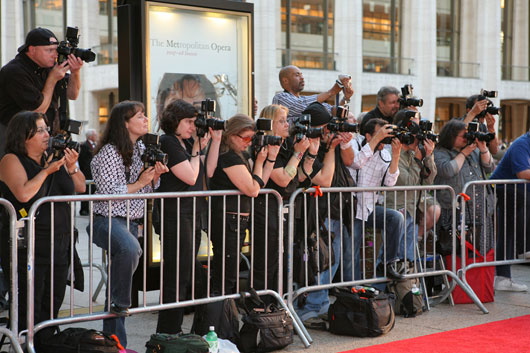
Paparazzi out in force -- this is the Met?

Replicas of Met Opera sets at Saks Fifth Avenue

Opening-night audience -- live at Times Square
Gallery Met was opened in a corner of the Met lobby to display commissioned as well as existing works by artists who have been recruited to forge a close relationship with the Met. The hope is to rekindle an alliance between the performing and visual arts. At one time David Hockney, Marc Chagall and other artists were involved in set design for the Met. Perhaps one day some of the artists now exhibiting at Gallery Met will contribute their talents to new productions.
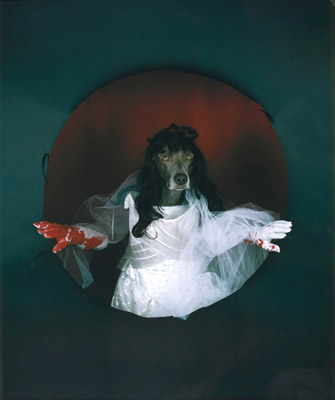
William Wegman Polaroid rendition of Lucia de Lammemoor
An example from the past season, the marketing of Satyagraha, illustrates how inspired marketing can work. Philip Glass's work is, for many, an acquired taste. If you add to that hurdle the fact that the Satyagraha libretto is written entirely in Sanskrit and that Met Titles are not used during the performance, it provides a marketing challenge of the highest level.
As the 2007-08 season began, here's what happened: Seven performances of Satyagraha was scheduled for the spring of 2008. Many subscribers who found Satyagraha included in their series decided to opt out of the Glass opera -- they traded in their seats for other operas. And single-ticker buyers turned out to be equally cool to the prospect of watching a Sanskrit work. Normally, as a season progresses, single-ticket sales start out filling up the house. But a funny thing happened in this case. The forecasted box office of Satyagraha started declining, and at an alarming rate. The more time that passed, the worse the box office ahead looked. If this continued, there was a chance the opera would play to near-empty houses.
So a marketing task force was put together. For a modest budget, aided by contributions from a board member, the team was able to create dozens of different marketing initiatives designed to attract specialized audiences. New-age magazines yoga groups, anti-apartheid organizations, India groups, South African organizations, et al.
It worked. By the end of its run, Satyagraha had sold out its run. (By the way, it was a terrific production. I like to quip that Satyagraha is now my favorite Sanskrit opera.) Next year, the same team will have an opportunity to apply its narrow-focus marketing techniques to selling the John Adams opera, Doctor Atomic -- a contemporary work about the creation of the atomic bomb.
(3) New Sources of Revenues -- HD Telecasts
The final and most exciting major initiative began two years ago -- live high-definition telecasts to theaters around the world. For 77 years, the Met has broadcast Saturday matinees performances to 11 million radio listeners in 42 countries. But, strangely, the Met actually has to pay many of the radio stations around the world to carry the broadcasts -- fees that amount to millions of dollars annually. (The irony of non-profit radio -- the Met owns the content, but has to pay to have its content broadcast!) Fortunately these radio broadcast costs have been underwritten by major corporate contributors (originally and for many years Texaco; for the last two years Toll Brothers, foundations and others).
With television, however, the economics are different from radio. The new HD telecasts cost on the order of $1 million each to produce and televise worldwide. They are shown in movie theaters that are equipped with satellite links and high definition projectors. But unlike radio, it's the the viewers who pay for the privilege of watching.
In the first season, 2006-07, six operas were telecast to about 325,000 viewers (these numbers include encore, non-live, repeat telecasts). This past season, eight operas were watched by 920,000 people in 23 countries who paid an average of $22 each. The Met splits the receipsix operas were telecast to about 325,000 viewers. Next year, eleven operas will be televised to an even larger number of screens and viewers.
The benefits of this initiative are potentially dramatic, for several reasons. First, revenues just about covered costs in the 2007-08 season; next year revenues should easily exceed costs, and thus become a contributor to the bottom line. Second, it is a terrific source of audience development. After just two years, more people now watch the Met Opera in movie theaters that in the opera house itself (around 850,000). Presumably many of the attendees will graduate from watching the opera in a movie theater to experiencing it at the Metropolitan Opera House. And finally, the HD program is public relations bonanza. The performances are covered by the local media in cities around the world as if the operas were actually held in those locales. The press clip file of the Met now has grown from magazine thickness to that of a telephone book.
The experience of watching an HD live telecast of the Met Opera is remarkable. In many ways it is an improvement over seeing the opera in person. Heresy? No, not really. To start with, the close-ups of the singers on the screen are simply not available in the opera house. Also unique are the live interviews with the performers during intermissions; many are caught just as the curtain falls and they head backstage. Or they're interviewed in their dressing rooms. And the specially produced documentaries shown during intermission -- for example, how the opera was rehearsed -- are insightful. Moreover, the high-definition images, color, and sound are all at the highest level. (Well, almost always. There have been times when the theater's equipment crashed, or went out of adjustment, or whatever. But, hey, they're still early on the learning curve.). Oh, and a final note of differentiation -- you can munch popcorn during the performance.
By the way, even though the telecasts are shown a month or so later on PBS, there is simply no comparison between seeing them in the theater and on a home TV system -- the giant screen imparts a totally different experience.
Needless to say, the Met's HD telecasts have been so successful that they have attracted competition. Already, La Scala and the San Francisco Opera have begun transmitting a limited number of their productions to theaters -- but not live. Their results so far have been dismal. A recent showing of a San Francisco Opera telecast in a New York theater had three people in the audience. By contrast, the Met's theaters are mostly sold out, and many of the theaters have added additional screens to accommodate the crowds.
The HD telecasts have created a salutary byproduct. It may be my imagination, or it may be real, but the singers at the Met, both male and female, seem to be getting slimmer. It's one thing to be a plus-size on the stage, but having one's one's image projected around the world on forty-foot-wide screens makes even the most confident superstar head for the gym.
Measures of success
Well, it's been two years now since the Met embarked on its new initiatives. What are the results? Here are three measures of success: box office, sell-outs, and subscription rates.
Box office improving strongly
The box office results for the last two years showed a dramatic improvement, rising seven points to 84% in 2006-07 and a further four points to 88% last year (maroon bars). Because each percentage point translates into roughly $1 million of revenue, the uplift to the Met bottom line is meaningful.
(These box office figures are for percentage of total dollar capacity. The actual number of seats filled is about six percentage points higher, or very close to 100% capacity. At every performance there are some discount seats and complimentary seats.)
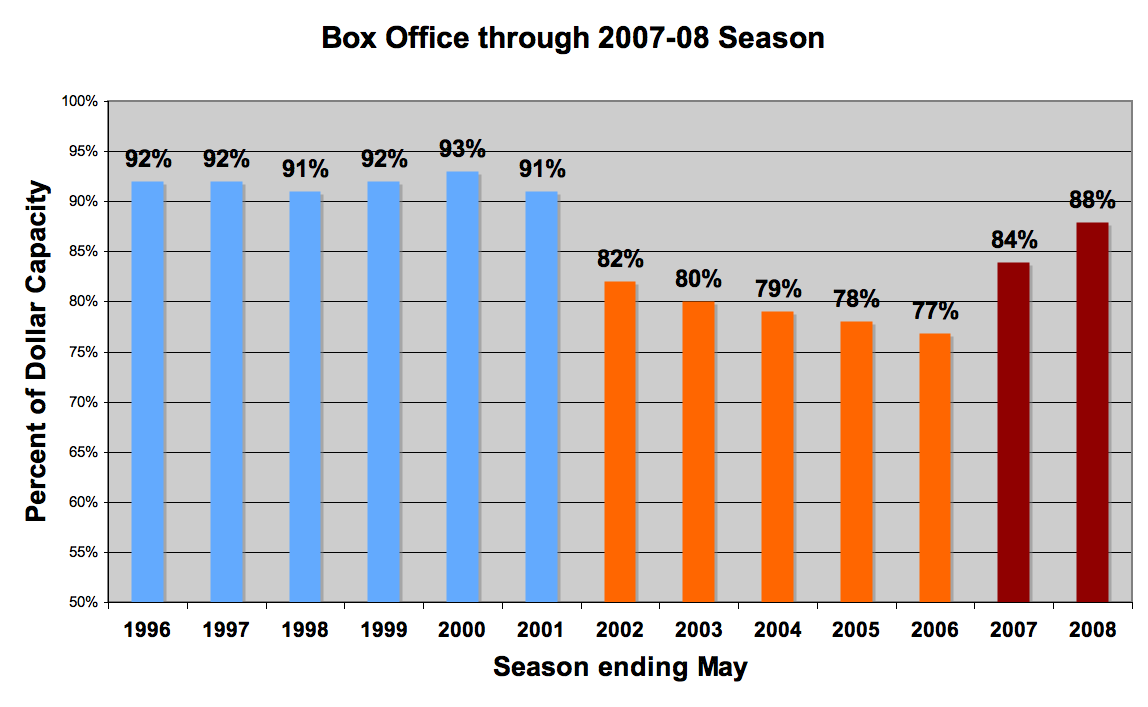
Sell-outs increasing rapidly
The second measure of success can be seen in the chart below on sold-out houses. After year-by-year declines earlier in the decade, sell-outs fell to a low of 10% in 2005-06. But just two years later, 58% of the season's performances sold out.
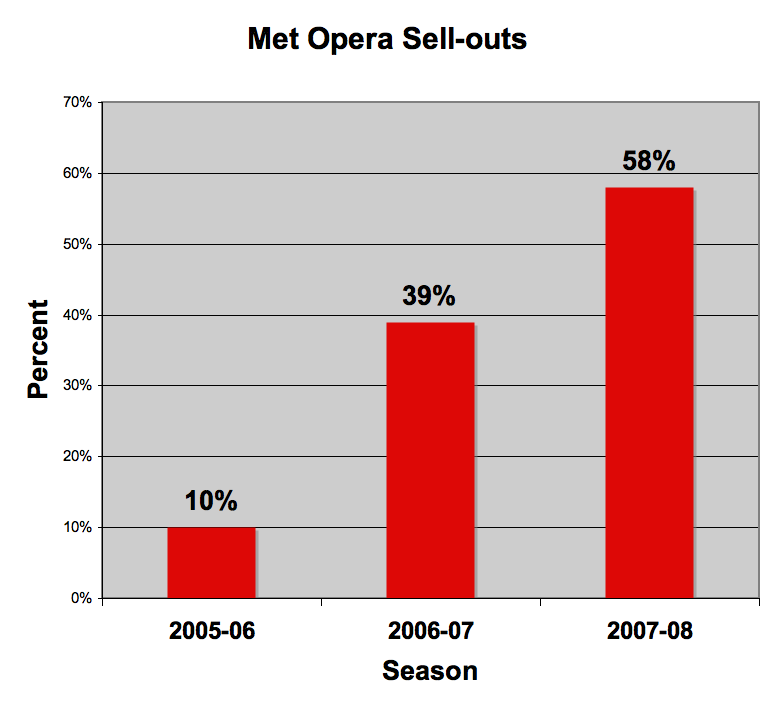
Besides the revenue impact of selling out the house, there are other important benefits. Sell-outs create buzz and excitement. It stimulates both the performers and the audience to see every seat in the house occupied. Sell-outs add to pricing strength. And, of course, everyone wants to go to a show that he can't get tickets to. Finally, sell-outs are a boon for selling subscriptions and for increasing philanthropy. For a number of years, when you could buy a ticket for just about any performance at any time, there was diminished incentive to subscribe or to make a donation. That's no longer the case; if you don't have a subscription, you may not have a chance to see the show you want. And now, these pressures increase the likelihood of donations in the hopes of getting better seats or subscriptions.
Subscriptions growing
In the early years of the decade, the number of full-series subscribers were diminishing. Because of little incentive to subscribe - tickets were freely available last minute - subscription levels declined every year (orange bars). That all changed in 2006-07, when subscription levels stopped dropping. Then, in 2007-08, full-series subscriptions rose 12.6% (maroon bar). Few other cultural organizations have shown that much growth in subscriptions in recent years, and fewer still double-digit growth.

Case Study Conclusion: The Battleship Has Turned
There seems to be enough data now to demonstrate that the Battleship Met has indeed turned around. Just two years ago, every indicator for the Met Opera was pointing down. And now they're all pointing up -- attendance, subscriptions, sellouts, philanthropy. And if one looks at that ephemeral quality associated with success -- buzz -- the Met now has it again. In fact, the Met has become the hot cultural ticket in town.
Yes, it's costing more money to effect these changes, but the increases in revenues -- from philanthropy, box office, and telecasts - are likely to offset these costs in the future.
Even though opera is an anachronism, a centuries-old art form replete with some of the creakiest plots imaginable, in 2008 opera - at least the Met Opera-- is where the action is. The Met has begun a new act. Who woulda thunk it?

Sunday, March 22, 2009
I Wish
Now, we are not only required to sing, but also to move, jump, run, act, scream. Unnecessary behaviors on the operatic stage.
The music tells you what is happening on stage. Most of the drama comes from you as the listeners.
And the very reason why singers don't sing well on stage these days is because they are worry about their acting skills and body movements.
Singers are trying to be actors, but they are horrible actors. So why try to act, when you have the music to do that for you? Use the the music.
I wonder how much freedom singers get on stage these days with the ruling stage directors and over the top slutty costumes.
Just a wish...maybe when I get there, things would have changed. They must, or I won't find freedom in performing the music.
Cabbage Wabbage
Another Beautiful Day
I have a recital today, and I was out late last night (which I knew I should'nt have).
I was slightly intoxicated. And usually when that happens I get pretty loud and use up my voice in unknown ways. lol.
But you know what? It's really not helpful when you make things seem worse than it is.
So, I've basically decided that everything's gonna be just spectacular in the recital today because singing is what I know best. I can sing. There! I've said it. I can really sing and when I'm on stage, I'm the center of the universe and nothing else in this world can stop me from doing what I'm suppose to do..
haha. For some reason that frightens me, but I need to get use to this idea. I am the performer, not just another.
Cabbage Wabbage
Saturday, March 21, 2009
One Last Piece for Today
O fairest art, how oft in hours blighted,
When I am trapped in life's wild race,
Hast thou with love on me alighted,
And flown me to a better place!
From thy sweet harp a sigh so often drifted,
A chord so holy and of bliss,
Thou show'dst me heaven's light uplifted,
O fairest art, I thank thee so for this!
My Recital Program
Torna, vezzosa Filide...Vincenzo Bellini
Il Zeffiro...Vincenzo Bellini
Liebst du um Schonheit...Gustav Mahler
Ich atmet einen linden Duft...Gustav Mahler
Ich bin der Welt abhanden gekommen...Gustav Mahler
Phantasie...Mahler
Intermission
La canzone di Doretta...Chi il bel sogno di Doretta pote indovinar...Giacomo Puccini (La Rondine)
Extinguish my eye...Leonard Bernstein
When my soul touches yours...Leonard Bernstein
The Poison Aria...Charles Gounod (Romeo et Juliette)
It's a great program. It's just gonna be challenging to pace myself throughout the hour. =)
I hope you can make it to my recital.
Cabbage Wabbage
I Have a Life Outside of My Music, Don't you Worry =)
I have 4 recitals coming up and I'm trying to make sure that I don't lose my focus in singing.
I am stressed out.
But I do have a life outside of my singing. There are other things I do as leisure as well.
Things like eating out. Going out for a jog. Working out. Reading in the sun. Hanging out. Having good spiritual or philosophical discussion.Shopping. Drawing. Painting. Sometimes, I go wild and rock climb or boulder with Alec.
I know, they're all pretty nerdy things to do.
I guess I'm just not a normal college students. I don't drink for fun anymore. That's stopped ever since 2nd year of college.
I don't go to bars. I don't find that scene entertaining at all. Unless of course if I am accompanied by entertaining friends.
I don't date around either. I love my boyfriend too much to seek for anyone else's attention.
I guess I am content with the fact that I have my music to spend time with. It really is a very meaningful part of humanity.
Music tells you a lot of things bout how the world works in reality.
Sadly, in our culture today, it is used differently from the actuality.
Cabbage Wabbage
Friday, March 20, 2009
I've been listening to this 4 times in a row now.
I know I've posted this piece before. But it's just so good. sooo good.
Indulge with me for a moment.
Cabbage Wabbage
Childhood Sweet Memories
The smell of the morning dew. The wet mornings that we get...and the morning glories! the morning glories! They are so beautiful. =)
The conversations I would have with the trees in my backyard.
Washing my school shoes by the drain at the back of the kitchen.
The morning breakfast drinks that mom would make for each of us.
The fish oil and sun cholera pills that we had to eat before going to school.
The countless guests that my parents would always have over.
The Bible stories my dad would tell us.
The family prayers we would have before bedtime.
Why does the past always catches you by surprise?
What is true? and What is made up?
Which ones are illusions? Or me playing pretend?
I like playing pretend, but at this point in life, I find that one cannot survive merely pretending.
You actually have to live now. And grow up. The decisions that you make now can actually seriously effect your future...
Scary. But if you really think about it...what purpose can a life bring if you're faking through it on a daily basis?
Not much really.
But on the other hand, we must never take today too seriously. Because today leaves, and you will too someday. You must not take your life on earth too seriously.
Cabbage Wabbage
I've Been Wondering
Growing up in Malaysia, I didn't even know what opera was. I was not educated on the importance of opera on classical music until I came here.
And now, I am pursuing a career in it. Hoping that someday, I will become another Montserrat Caballe with a Callas twist.
Funny. Funny. Just makes me wonder what other things can possibly happen in my life time.
I've been reminiscing again. Comparing my past to the present. I am not who I thought I was at all.
In fact, I don't think I had a clue about who I was growing up.
It must be that whole being the middle child syndrome, but I've always been so unstable in my identity ever since I was young. My parents had no idea how to raise me. They could never tell what I actually wanted.
It's funny. Coz I really don't know if being an opera singer is my last & final decision. I'm sure things will change considering how it has been for me in the past 20 years.
Meh, just a thought that came to me in the past 15 minutes.
Cabbage Wabbage
I Really Really Really Enjoy This!
Corelli and Freni singing in Carmen. How B-E-A-U-T-I-F-U-L!!!
Cabbage Wabbage
The Time Length of This Process
It may seem like that, trust me.
It seems like you may learn one thing today, but forget another the next day. But you just have trust that all the time you've spent in the practice rooms can really pay off someday.
It requires a lot of commitment to be a great opera artist. You don't just need the talent, you need the patience, determination, and perseverance.
Daily practice: 3 hours the least
Daily research: 4 hours the least
-Language, composer style, listening to other interpretations, history of the musical piece
Preparation for a recital program: 1-2 years the least
Preparation for an operatic role: 4-5 years the least
Opera companies usually begin planning the opera production 4 years in advance.
Casting begins 2 years before production.
Opera singers rehearse for 14 days of less with the conductor, director, set and costume designers.
After these 14 rehearsals, they begin working with the stage setting and character make up
Dress rehearsal 2 to 3 days before the performance
These time lengths does not include the psychological and physical battles that you may have to fight during the process.
Artists are very sensitive and emotional individuals. They must learn how to separate their daily personal emotions the moment they go on stage. Psychological and mental break downs are one of the main factors that cause inconsistencies and difficulties for many great artists.
Most opera singers seek help by finding themselves counselors and therapists to stabilize their emotions.
The Importance of Finding a Good Accompanist
Through my process as a singer I have seen 3 types of accompanist.
1) Tough Ass
An accompanist who has his own idea of how the music should sound like and forces his idea on the singer. This type of accompanist regularly judges/criticizes the singer and is not willing to make changes for the singer's voice. His pride gets in the way of the collaboration to make beautiful music.
2) Lost Sheep
An accompanist who has no idea of how the music should sound like. Too worried and self conscious of his playing that he forgets about the singer. This accompanist will make you walk out the rehearsals feeling extremely lost, confused, and unaccomplished. His insecurity gets in the way of creating honest and true music.
3) The Right Match
An accompanist who has ideas but is willing to consider the singer's ideas as well. This accompanist never judges to criticize the singer, but only has the intention of making the music sound as true and honest as it can be. His musical choices are convicted by what he and the singer think is right for the voice and the score. He is sure of himself and is confident in the singer in their musicianship.
They are all talented musicians, but there has only been one type that I would work with and that would be type 3.
Making the right choice for an accompanist is important because your final product(recitals and auditions) really depends on how collaborative both parties are during the rehearsal process.
Also, hiring accompanists is not cheap. It cost $40 per session. And that's already considered pretty cheap. Usually, to prepare for a recital, you must meet with your accompanist as frequent as you can 2 months prior to your recital.
So, once again, you need to make your money worth it!
Steps To Promote Yourself
1. Make a High Quality Demo Recording
Make a recording of yourself in a professional studio. Then send to as many potential agents all over the country. You may also send the recording to potential grad schools, as well as potential young apprenticeship opera programs around the country. Most applications for vocal competitions such as the Metropolitan Opera Competition requires a recording before calling in the vocalist for a live audition.
2. Broaden Your Stage Experience
Join competitions, audition for regional opera companies, and organize recitals containing a wide range of repertoire that you would use in your big shot auditions. The more you perform, the more comfortable and confident you will become on stage.
Make sure to find a good and talented accompanist during this process. A good artist begins rehearsing twice a week with the accompanist 2 months prior to the performance. It cost $40 to have an hour session.
3. Broaden Your Resume
Win competitions and audition for spots that could possibly get you noticed by the big shot opera companies. It's not just about the quantity, but also the quality. Make sure to earn yourself world known gigs to draw more future audience and potential agents.
4. Audition for an Agent
Once you have built an impressive resume and own a good demo recording of yourself, you may find yourself in search of an agent. Most good opera agent companies settle in the East Coast, so you may have to move there for a year or two hunting for a good agent. A good agent helps you find gigs and roles to perform with nationally and world known opera houses. Some good agents would find you opera roles with opera companies in Europe.
Thursday, March 19, 2009
The Responsibility of An Aspiring Opera Singer
1. Practice
Understanding and mastering the art form. You cannot perform the art if you don't even believe in the art. It's not a "fake it till you make it" type of career.
2. Find the Right Vocal Coach
Having voice lessons are not cheap. A lesson with a great singer can cost up to $80 for an hour. So you must find a teacher that fits you and make your dough worth it.
3. Broaden Your Musical Skills
Take piano lessons on the side. Most operatic songs and arias are accompanied by an orchestra or a piano arrangement of the orchestra. As an operatic singer, knowing what your accompaniment sound like is important because the singer's line is constantly interacting with accompaniment line.
4. Broaden Your Stage Skills
As a performer, you are the vehicle that transports the audience into the world of the music. You must know how to communicate your musical ideas on stage without being indulged in the music. You must learn how to move, gesture, and facially express what is happening in the music.
Pursuing acting classes may also become necessary to help increase your skill in communicating the drama of the music.
In Grad Schools , Music Conservatories, and Young Artist Programs, vocal performance students are required to take combat classes (fencing, martial arts, etc.), dance lessons (tango, ballroom, salsa, etc.) and Asian Theater Body Movement classes. The purpose of these classes is to enhance the young performer's body language and awareness on stage.
True Singing
http://www.youtube.com/watch?v=EZJqR_8uE9s
It's just right. There's nothing wrong at all. Why? Because they know what they're singing and they are so true on stage with their singing. It doesn't matter how they gesture, how realistic their gestures are, that's not what they're thinking about. They just want to tell the story.
Isn't that lovely? Why be fake and superficial, if everything that the listeners need to know has already been written in the music?
Just lovely. Just exquisite.
Cabbage Wabbage
Wednesday, March 18, 2009
Standchen by Schubert
Her name is Hei-Kyung Hong. How have not heard of her good singing?
Good voice. Good technique.
I like.
Cabbage Wabbage
Honesty is Key
Every action counts only if it is driven by truth and sincerity.
Why don't we see the importance of honesty in life anymore?
Why don't audience realize that a performance cannot be true and complete without sincerity and truth?
As an artist, I find myself weary whenever I perform in disguise.
Hiding myself in the music.
Music is an expression, not a shelter.
It should transport the artist and the listeners to the world unknown.
Now, how can the artist lead the listeners to that place if they don't even believe in such existence?
The performance can only be true and honest if the artist is true and honest.
It can only be convicting if the artist is convicted by his personal instincts and emotions.
I think this applies not only to singing, but also to the ways of the world.
Whaddya think?
Cabbage Wabbage
Spring Makes You Wanna Go Slow
Which is...NOT GOOD.
Oh God!!! I have a recital in 2 weeks and what am I doing? Wasting my time looking at silly pictures on my sister's profile.
I'm sooo happy and relief that I'm done with the recital posters and flyers. Now I just need to get them stamped and posted on every wall I can find in Augsburg's campus.
You know what? Lately I feel like I'm forgetting something everytime I walk out of my room. All I can think about for now is preparing for my two huge recitals.
Reminder: Must still live even at times like this.
This Sunday, I have a small performance coming up in MacPhail. I'll be performing a piece from the Romeo and Juliette opera. Quite long, quite complicated, quite scary. AHHHHHHH.....scawie.
Alright...I must pull myself together. lol. Yea, I know. I'm crazy. No need to say nothing. I already know and have accepted this fact long time ago.
hahaha....(awkward silence)
Till then,
Cabbage Wabbage
Tuesday, March 17, 2009
You are Welcomed to My Recital
Well, you should really stop by Sateren Auditorium and spend an hour listening to beautifully composed music.
I will be singing a collection of pieces from the early Romantics all the way up to the 20th Century.
Would you join me, please?
Monday, March 16, 2009
A Great Morning
I just had a cup of coffee. And a cup of soy coco hot cereal.
And I am about to go outside and have a good jog in this lovely weather.
Did you know that it'll be up in the 60's today? How lovely. That just makes me smile.
I love the season of spring.
It's about forgetting the cold bitter winter.
And remembering the light in beautiful colors of flowers, trees, and smiles.
Remembering the second chance that we're all given.
Another chance to live and breathe and taste.
It's really one of best seasons anyone can ever experience.
Sadly, the stress of the academic world comes after us around this time.
Final projects. Finals. Sickened from seeing the same people in class, hearing the same old professor yippin away for an hour.
I wish classes are held outside in the park around this time.
There's no reason why we should be sitting in classrooms when nature is clearly calling for us.
Cabbage Wabbage
Wednesday, March 11, 2009
I Knew Pavarotti in My Dream
It saddened me.
It saddens me to realize that to me, Pavarotti was just a myth. How I wish I would have had a chance to sing with him.
I've been doing some research on his inheritance. And this is what I've learned...
Pavarotti's family may have to sing for their inheritance
5:00AM Tuesday Mar 04, 2008
Luciano Pavarotti passed away in 2007. Photo / Herald on Sunday
Luciano Pavarotti's reign as opera's biggest star did not bequeath the inheritance his family might have imagined. The Italian tenor died about $17 million in the red, his estate has revealed.
The debts emerged after weeks of careful combing through bank accounts and shareholdings held by Pavarotti, who died last September of pancreatic cancer, aged 71. They were filed in a court in Modena, Italy, last week by notary Giorgio Cariani.
Pavarotti's fortune had previously been estimated at $500 million. Rumours of debts surfaced in October but were played down.
"We have only just started taking the inventory," Mr Cariani said at the time.
"These figures are just a tiny part, so you are only seeing a partial vision of his finances."
But the full picture, laid bare in a 100-page document, is no rosier.
The document does list property owned by the star, including three villas and an apartment in Italy, as well as an apartment in Monaco, but does not list their value. That could come under scrutiny as his inheritance is carved up between his widow, Nicoletta Mantovani, and his three daughters by his first marriage, Lorenza, Cristina and Giuliana.
Publicly, Ms Mantovani has played down speculation over a potential battle.
"There is an atmosphere of fair play and correctness within Luciano Pavarotti's family and among their lawyers over the inheritance of the maestro's estate," said Anna Maria Bernini, a lawyer representing Ms Mantovani and her daughter by Pavarotti, Alice, who was born in 2003.
Under Italian law, 50 per cent of Pavarotti's estate will be split equally between his four daughters, with a further 25 per cent given to his widow.
Pavarotti allocated the final quarter to Ms Mantovani, who worked as his secretary during his first marriage. He left his wife of 35 years, Adua, to live with her in 1996.
With the publication of the estate, Pavarotti's American assets, reportedly including three Manhattan apartments, works of art and bank accounts, could again fall under the spotlight. The assets were placed in a trust for Ms Mantovani by Pavarotti in July and it is not yet clear how they will be included in the division of his wealth envisaged by Italian law.
Their value is not mentioned in the new document.
An Italian magistrate said in October he would look into the trust after a notary present at the signing was quoted as questioning the lucidity of the ailing Pavarotti, who was taken to hospital in mid-August to be treated for a chest infection.
But Luciano Bovicelli, a doctor who witnessed the signing, said the singer was fully aware.
"Luciano was absolutely in control of what he was doing, he was very lucid and present," Dr Bovicelli said.
"Luciano always worried about everyone," she said, "and he left a lot for everyone."
Part of the inventory is 18 operatic costumes fitted for Pavarotti's girth and worn during his career.
So surprising. It is unfortunate that the death of someone so great and powerful may cause this much grief and anxiety.
Cite from: http://www.nzherald.co.nz/opera/news/article.cfm?c_id=274&objectid=10495947
Cabbage Wabbage
Tuesday, March 10, 2009
An Example of a Focused Singing
So here is a great example. Jussi Bjorling. Small and gentle voice. There's really no edge to his voice, but it is so focused and true. He's always singing on the voice that he has. Not trying to manipulate, not trying to make it bigger than what it is. But just singing. His breath is focused and the air pressure that he gives on each note is even. His dynamics are never forced, but are always sung with conviction. You can tell as he sings that he has already decided what he plans to do for his phrases.
Very lovely. That's what makes a great artist. Not because he tries to be great. Not because he wants to be the star. But because he is true and real to the music, his voice, and himself.
Cabbage Wabbage
A Good Accompanist
It was interesting because I never realized how engaged an accompanist has to be while playing for the soloist. There's so much to consider and it is very challenging.
Accompanying is not about making background music for the soloist, but it takes a very intelligence and humility to accompany successfully.
You have to follow the pace of the singer while keeping a steady rhythm for the soloist.
You have to know the harmonies of the music. You have to imitate the sound of an orchestra.
You have to listen to the dynamics of the soloist. You have to know what different soloist needs in different pieces.
And after doing all of that, you as the accompanist most importantly must never allow your own ideas and feelings for the music get in the way of the soloist's interpretation of the music.
Oh man. I look at my accompanist from a brand new perspective now.
I have so much respect for him now that I've learned all of this.
Cabbage Wabbage
Monday, March 9, 2009
The Air When It's Right
Your job is to keep your body stable on the piece of ice. You have to make sure that you are able to stand on this ice for... as long as you can imagine. Otherwise, the ice may flip over and that's the end of you.
Your life depends on it.
You are able to move the top part of your body all you want, but if you are not grounded on your waist down, that's the end of you.
You must make sure that the top half of your body stays as comfortable as possible. Otherwise, you may be wasting your breathing energy by placing unnecessary tension the top half of your body. The most common area for tension is around the jaw and tongue. Singers like to manipulate the sound with the mouth and jaw area. Instead of trying to create the sound, the singer must allow the breath to support the sound at the right place. You can pace your breath, but you can't control or manipulate it. It must still feel natural and just right.
Easy to say, very difficult to do.
One way or another, just remember that when singing, hips down must feel connected to the floor. Waist up is uncontrolled, fluid, and movements are guided by the hips down.
Hope this helps.
Cabbage Wabbage
This will make your day
Cabbage Wabbage
Sunday, March 8, 2009
Olga Borodina
I wonder if there's anyone else who can sing like this.
Controlled Vs. Focused
A beautiful voice can never be manufactured. It is natural. It is priceless. It can never be bought. It's either you're born with it, or not.
But for some reason, the one who is born with the voice seem to have the harder time recognizing and appreciating the very quality that makes the voice beautiful.
We find ways to make it beautiful. We think that true beauty comes from our blood and sweat.
Yes, you work hard to reach perfection, but in the end perfection happens when you decide to trust. And just love.
I've been thinking about this lately. True beauty can never be duplicated. And whenever it is duplicated, somehow it becomes ugly.
Fake.
Superficial.
Just another...
material.
But we get so selfish whenever true beauty becomes recognized.
It will either be used or destroyed for selfish ambitions.
Why? I don't know. But it seems to be our endless cycle.
Isn't what we have enough to love?
I was thinking about the beaches in Malaysia. How much I cherished the memories of me sipping on coconut juice while gently being blown by the ocean breeze.
Yea, well guess what the government did to the beautiful beach?
They decided to tear down the beautiful beach and build a mall right by the flattened beach.
for money.
Just another cycle.
BUT, not all is hopeless. There is still true beauty here on earth.
There must be.
Cabbage Wabbage
Saturday, March 7, 2009
Amusements
1) Research Projects
2) Presentations
3) GPAs
4) Tuition Fees
5) Financial Aid and Scholarships
Sometimes, I find humanity amusing. How it sets itself up in the most difficult structure. And then tries to redeem itself by setting up "solutions" to its own problem. But those solutions somehow builds up more problems for the humanity.
Sometimes, I laugh at myself for being so caught up. Taking life and myself too seriously. There must be balance in everything you do. You can't take life too seriously, but you can't take life too lightly.
hahaha...
So I've just came up with an idea of how I want my recital poster to look like. It'll consist of me and a music note.
I just need to get my picture taken by my sister who happens to be the most professional and talented photographer I know in town. ;)
Have a great weekend.
Be kind to yourself.
Cabbage Wabbage
French is so Difficult to Sing on!!!!
FRENCH!==>
Yea try singing that...*shrieks*
Ever since March began, I haven't had a chance to pause. The computer in my head won't stop running. (which isn't necessarily a bad thing)
But it gets pretty tiring.
Hope all is well.
Cabbage Wabbage
Friday, February 27, 2009
Important sources for My Opera Marketing Project
http://www.andante.com/article/article.cfm?id=25695
http://well.blogs.nytimes.com/2009/02/04/the-incredible-shrinking-opera-singer/
http://www.sfgate.com/cgi-bin/article.cgi?f=/chronicle/archive/2001/07/13/WB15814.DTL&type=news
http://www.metoperafamily.org/operanews/issue/article.aspx?id=2831&issueID=127
Google: Marketing Opera
Google: Opera Singer Today
Google: Young Opera Singers
Vanne, O Rosa Fortunata by Bellini
Go, fortunate rose,Cabbage Wabbage
to rest at Nice's breast
and all will be forced
to envy your fate.
Oh, if I could change myself
into you, but for a moment,
my heart would long
for no greater happiness.
But you bow your head with spite,
fair faded rose,
your brow loses all colour
from disdain and pain.
Lovely rose, it is destined,
that we meet the same fate:
we shall both meet death there,
you from envy and I of love.
Translated by Camilla Bugge
My Very First Tango Lesson
It was the most marvelous experience I've had in a while. I've always loved to dance as a kid, but never had the means to take lessons. But last night, I understood that my love for dance has yet to cease.
There is such flow and confident on the tango dance floor. Swift but not fast. It flows like clear river, but like the currents, you must keep the rhythm.
Ya? Tango is a beautiful choice.
I will keep taking classes from this teacher, Florencia. She's from Argentina, so she knows the real deal here.
4 things I've learned from this lesson:
1) Feel an electric connection from your chest to the partner's chest
2) Move from the hip down
3) Trust your partner who happens to be the leader since I am in fact the female
4) Shoulders rolled back, chest high supported from your diaphragm
Oh, one last thing: Rhythm, rhythm, RHYTHM!!!!
Cabbage Wabbage

